Election 2015: TV debate yields no 'killer blow'
- Published
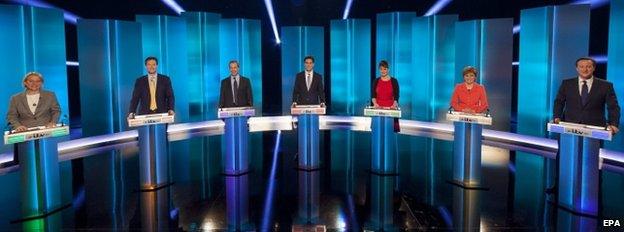
There could have been no better image of the changing political landscape of Britain.
While 50 years ago two parties took almost every vote between them, and just five years ago viewers of the TV debates might well have thought the era of three-party politics was permanent, this time there were seven politicians on stage. And three were women.
The SNP's Nicola Sturgeon dressed boldly in red - perhaps to underline her determination to supplant Labour as the main party in Scotland. And she derided the "old boys' network" in SW1.
The prime minister was introduced last and it looked as though he found it difficult to keep a smile on his face for the time it took to welcome his six opponents.
He seemed to grow in confidence but was perhaps wondering initially why he was so insistent on broadening the field from the 2010 threesome.
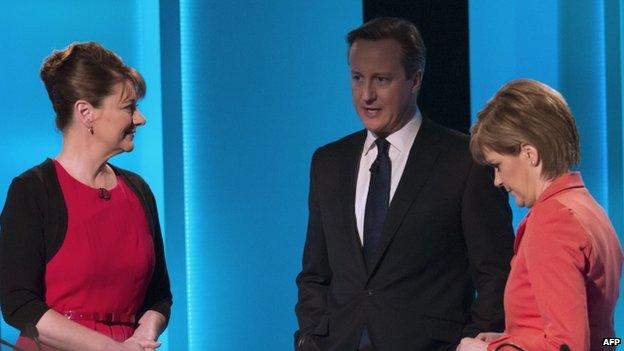
You could almost believe the women on the panel - Natalie Bennett from the Greens, and Leanne Wood from Plaid Cymru, as well as Ms Sturgeon - had consulted each other over launching an early attack on the austerity advocated by the main Westminster parties.
Those parties showed no such solidarity amongst themselves.
As soon as the period of open debate began, Nick Clegg launched his opening salvo against his coalition partner of five years - denouncing David Cameron for wanting to cut more than is necessary.
'Austerity-lite'
In response there was no "I agree with Nick" this time. In fact, probably Ed Miliband's best line of the night was when he said: "They are blaming each other and they are both right."
The prime minister, however, didn't adopt a combative tone, suggesting he was still trying to broaden his party's appeal rather than simply motivate his core vote. He argued he had a "balanced" programme, he would invest in the NHS and only cut £1 from every £100 the government spent.
For his troubles, he was then attacked from the right - Nigel Farage ridiculing a lack of rigour in eliminating the deficit thus far.
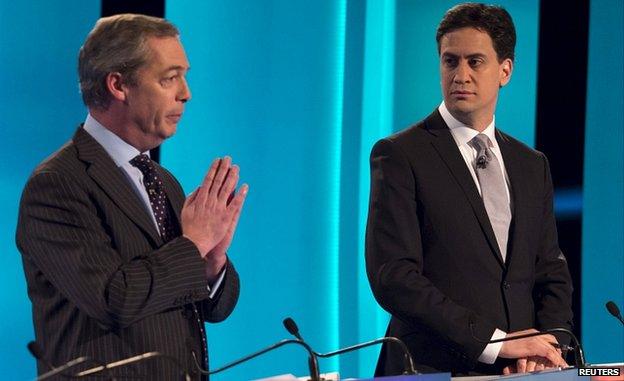
Mr Miliband was mocked for a policy of austerity-lite by the two nationalist parties, so he tacked to the left by stressing an end to what he calls the "bedroom tax", and the extension of a tax on bankers' bonuses.
With Labour and the SNP battling for the same voters in some parts of Scotland in a contest which could determine whether Mr Miliband makes it to No 10, it was hardly surprising that some of the noisiest clashes were between him and Ms Sturgeon. The Labour leader, remaining on the left, counter-attacked by suggesting the Scottish government had also made cuts.
But he soon remembered his debate preparation - the need to try to look prime ministerial and talk to voters, not other politicians - so he then turned to the camera, addressing the nation - a technique which David Cameron had mastered a little sooner.
'Scaremongering'
The exchanges on the NHS were full of more heat than light, with multiple accusations of scaremongering.
With health seen as a Labour issue, David Cameron went in hard on Mr Miliband - raising the fatal malpractice in Mid-Staffordshire under the previous government and deriding his opponent's intention to "weaponise" the health service in the campaign.
The Labour leader didn't deny it and tried to turn it to his advantage by saying people should use their votes as a weapon.
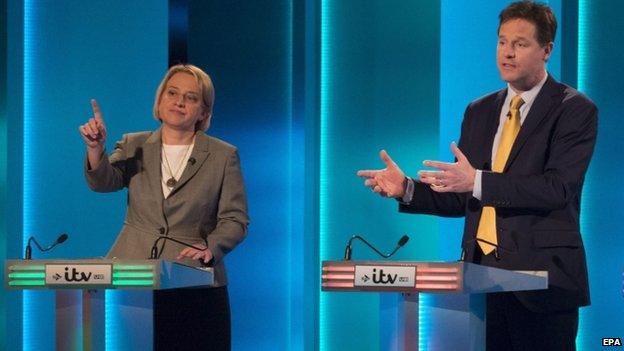
But the only applause was when Ms Wood verbally slapped down Mr Farage for raising the issue of foreign HIV sufferers benefitting from NHS treatment.
He, in turn, attacked Mr Clegg over immigration, in a temporary reprise of the EU debate they staged before last year's European elections.
But it was on Europe that any form of discipline broke down, with Mr Miliband and the PM appealing to the chair to rebut accusations from each other, as well as Mr Farage.
Psychologists would stress the importance of body language. Mr Miliband did a good line in raised eyebrows, Ms Sturgeon favoured a derisive head shake, Mr Farage often adopted an incredulous widening, then narrowing, of the eyes, while Mr Cameron seemed adept at turning away from opponents and fixing his focus on the audience.
Catchphrases
Some prepared catchphrases were well deployed. Ed Miliband channelled Ronald Reagan, a master of debate, when he said: "There you go again." David Cameron had the memorable attack on Labour's policy on zero-hours contracts - that it would lead to "zero jobs" - and Nick Clegg told his fellow politicians to put their money where their "heart" is on the NHS. However, perhaps Nicola Sturgeon's pithy put down of the Westminster coterie - a mutter of "this is depressing" - will have struck a chord with the less politically committed members of the audience.
Nick Clegg mentioned his own failure to scrap tuition fees and said he did the "next best thing" but there was no sign of Cleggmania this time.
In fact, only one member of the audience went wild - a woman who stood up and shouted about a lack of housing for former members of the armed forces. Her comments concluded with the sound of a slamming door.
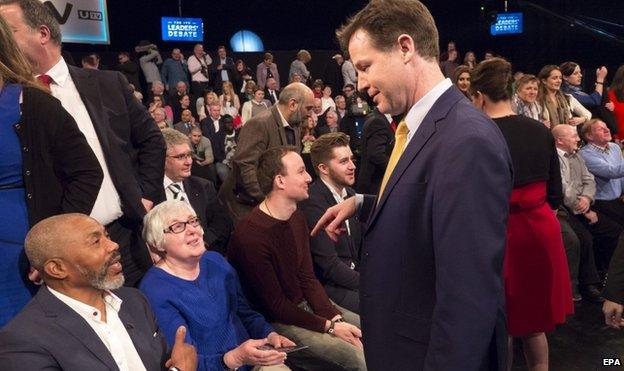
She may have delivered her verdict, it's now up to the pollsters to try swiftly to assess the wider public mood.
Each party leader got their message across - the soundbites were readily identifiable - but while this might have been a defining moment in putting the fragmented nature of our politics on display on prime-time television, it didn't really feel like a defining moment in the election. Only two of the participants can become (or remain) prime minister.
There was a late burst of real passion from Ed Miliband, and a more low-key performance from the David Cameron, but neither appeared to deliver a killer blow. Perhaps dividing lines were blurred by the very nature of a seven-way debate. With the most to lose, that outcome is likely to suit Mr Cameron more than his Labour challenger.
Any early regrets by the prime minister of encouraging a wider field probably evaporated after the two-hour event concluded.